|
|
| |
| EVENTS |
|
|
> PILDAT Conference on Rule of Law and Democracy in Pakistan: the Road to the Future
Prime Minister Yusuf Raza Gilani welcomes recommendations on Balochistan, FATA and the Civil-Military Relations
|
| |
|
Conference News
June 17, 2008
Marriot Hotel, Islamabad
|
|
| |
Prime Minister of Pakistan Honourable Syed Yusuf Raza Gilani welcomed the policy recommendations put forward at the PILDAT Conference on Rule of Law and Democracy in Pakistan: the Road to the Future held on June 17, 2008 at Islamabad. The Prime Minister was addressing the Concluding Session of the Conference. |
|
| |
The one-day Conference discussed three diverse topics: Issues in Balochistan, FATA and the Civil-Military Equation in Pakistan and how the application of the Rule of Law can help resolve these issues. The conference was addressed by prominent subject-specialists and renowned personalities in various sessions such as Justice (Retd.) Saeed uz Zaman Siddiqui, Former Chief Justice of Pakistan; Senator Sana-ullah Baloch, Balochistan National Party-Mengal (BNP-M); Dr. Abdul Hayee Baloch, President, National Party; Senator Abdur Rahim Mandokhel, PKMAP; Dr. Gulfaraz Ahmad, Former Federal Secretary; Senator S. M. Zafar, Chairman Senate Functional Committee on Human Rights; Barrister Zafarullah Khan, Lawyer; Mr. Khalid Aziz, Former Chief Secretary NWFP; Mr. Ayaz Wazir, Former Ambassador; Lt. Gen. (Retd.) Moinuddin Haider, Former Governor Sindh; Mr. Shahid Hamid, Former Governor Punjab; Mr. Hussain Haroon, Former Speaker Sindh Assembly and Mr. Javed Jabbar, Former Senator & Federal Minister.
|
|
| |
Initiating Session 1 of the Conference titled State of the Rule of Law and Balochistan, Mr. Ahmed Bilal Mehboob said that rule of law is the only factor that distinguishes an organised society from a lawless society. He said that in the context of Pakistan, Rule of Law is the only guarantee to keep citizens and the federating units together. He said that the absence of Rule of Law meant the law of the rulers which does not bear well for a democratising polity and society. The greatest manifestation of violation of rule of law has been the judicial crisis. Pakistanis� rejection of the measures against the higher judiciary represents the presence of democratic norms in the society. He said that PILDAT believes that some of they issues confronting Pakistan, though they may differ in nature and intensity, can be resolved only through the application of the Rule of Law. The Pakistani State and Society are confronted with a number of issues and conflicts today. Although these issues differ in nature and in detail � such as the Balochistan Issue, Insurgency in FATA, governance malaise in the shape of Military intrusion in what is now universally recognised as civilians preserve � we feel the application of the Rule of Law to resolve these and many other issues is the only way forward for Pakistan. The crises in Pakistan today are manifestations of crisis in the rule of law. It is with this backdrop that PILDAT is hosting a conference to focus on, what we term, as the key conflicts in Pakistan today, and how the application of the principles of the Rule of Law can help us resolve these issues.
Talking on the topic of Balochistan Issue: What are the problems? What are the Constitutional & Legal Solutions, Senator Sanaullah Baloch said that Rule of law protects fundamental political, social, and economic rights and it means that no individual, President or a private citizen, stands above the law. Contrary to this principle, in the past 8 years, it has been the person of General Musharraf who has made all decisions above the law. He said Balochistan and other smaller provinces have especially suffered due to that style of governance by the military and civil elite which consider themselves above the law. Balochistan, he said, has had more than its enough share of problems. The courts and the judicial system which was supposed to act on the side of justice and the people has almost always stood on the side of the oppressor and the ruler rather than the ruled. He said that Pakistan�s Constitution contains adequate guarantees for maintaining Rule of Law and Centre-Province relations. However, what is missing is the regulatory frame work, political will and governance institutions that can translate those gurantees into the every-day life of the people. He said that Balochistan is simmering and contrary to the propaganda of the former rulers, its issues are not those created or played up by the �tribal sardars� but these are issues close to the heart of every Baloch resident. He said no meaningful resolution to the problems can be found until the real civil-military establishment of the country sits down to talk to the Baloch nationalist parties including the BNP-M, NP, PKMAP, JWP and the Marri and Bugti tribes. He said that conversation at the level of the Senate is meaningless as that is not the fountainhead of real power in the country.
In order to bring peace to Balochistan and to make Blochis feel like a part of Pakistan, certain immediate Confidence Building Measures (CBMs) are required. These include Redirecting of all available funds for military developments in the province towards the socio-economic development; Pulling back of all military and paramilitary forces to their 1999 positions and removing all FC check-posts established at variance with constitutional safeguards; Immediate assessment of all damages caused by the military operation; Rehabilitation of displaced populations of Dera Bugti and Kohlu districts; Release of all political prisoners; Cancellation of all allotments of civil/military lands made between 1999 and 2008 in districts Gwadar and Lasbela; Ending the policy of amalgamating locally recruited Levies with the police force. The less costly traditional Levies force must be modernised and equipped; Equal wellhead price for gas and reasonable royalty for the province and Ending the agencies� role in Balochistan�s political, social and tribal affairs. He believed that restructuring of 1973 Constitution to make it more flexible and workable to reduce centre-province confrontation risks is the need of the hour. The federal government will also have to agree to the granting of provincial autonomy to the provinces by abolishing the concurrent list and incorporating a new provincial legislative list in the constitution. He demanded that the new provincial list must include complete authority to the provinces over their natural resource, including oil, gas, copper and gold, as well as ports and shipping, to improve and facilitate their economic growth. In addition, Law and order issues and longstanding unemployment in the provinces, particularly in Balochistan, need to be addressed by giving the provinces control over the civil armed forces such as the Frontier Corp, Rangers and the Coast Guard. |
|
| |
Sharing his views on the topic of Balochistan Issue: What should the Government Do? President of the National Party, Dr. Hayee Baloch said that if Balochis raise a voice for their rights, they are immediately termed as �anti-national� by the establishment of the country. He said that it was really painful that loyalty of citizens is questioned to the very country which has given them identity. He said that there existed Establishment does not want democracy in the country. The people have never ruled the country throughout the history of Pakistan. Establishing the rule of law is not in the interest of the ruling class. He said that the military establishment in Pakistan has been responsible for the present crises in the country including Balochistan. Pakistan is a multi-national state which the establishment needs to realise that. He believed that we should not be divided into administrative units as we are different nations and not provinces. This fundamental truth has to be realised in order to move forward. Balochis feel that the natural resources of Balochistan have not benefited the province despite supporting the national economy since 1952. Balochistan has not a part of the sub-continent, historically and the British respected the culture and language of the people of Balochistan but the present establishment aims to turn the Baloch people into red-Indians. The establishment has been propagating that Baloch leadership does not want development. Balochistan needs development and its fair share of resources. The problems will not be solved through the issues of autonomy or abolishing of the concurrent list. Unless the power is returned to the people and the various nations are recognised, the problems will not be solved. He said that the country needs a democratic revolution. The present political leadership talking about compromise with military dictatorship will only strengthen the dictators.
Representing the views of Pakhnoonkhwa Milli Awami Party (PKMAP) on the topic of Balochistan Issue: What are the responsibilities of the Parties? Senator Abdur Rahim Khan Mandokhel said that the 1973 Constitution provided the base for provincial autonomy but the amendments to the constitution 1977 onwards have restricted the powers and authorities of the province. The resources of the province have not been shared with Balochistan fairly which is a cause of deep resentment. The province receives nominal payback from the centre and also gets low share of water despite vast area. He said that it was a wrong image that the Balochis did not want to be part of the federation. He said that Balochistan today needs a fair social contract defining the roles of the centre and the provinces. We have had a tradition of struggle against the British establishment and now the Pakistani establishment. He demanded that military operation should immediately stop in Balochistan. Instead Levies need to be made strong. He also demanded that the land forcibly taken from the people has to be compensated for.
Speaking on Balochistan Issue: What can the State and the Government do to resolve the problems? Dr. Gulfaraz Ahmad said that demands for the rights of Balochistan are not new and that the province has struggled for the same as well as provincial autonomy in order to preserve its entity. He added that the Federating units of any Federation are supposed to complement the strengths and cover the weaknesses of each other, however, in the case of Pakistan, the country has not been able to achieve this level of harmony. Dr. Gulfraz said that even the exclusively provincial subjects have not been able to be fully discharged by the provinces because the actual purse strings are controlled by the Centre through bodies such as the National Economic Council and the National Finance Commission. He said that while deciding the formula for divisible pool, population disparities have to be taken into account. Similarly area disparities have to be taken into account also and the two factors have to be combined for a fair division. When massive areas are occupied by fewer people, the cost of providing public services rises significantly. The relative cost of providing the services should then be the criteria for distribution of resources. Giving the example of Australia, he said that the cost of providing to the South is three times that of the North and in Balochistan the difference is at least the same. Dr. Gulfaraz Ahmed pointed out that Balochistan has the lowest Human Development Index amongst all the provinces of Pakistan and similarly the Dera Bugti district in Balochistan has the lowest human development amongst all the districts in Pakistan despite being a centre of gas resources.
Concluding the session, Justice (Retd.) Saeed uz Zaman Siddiqui said that to keep the federation in place, it is necessary that the people living in the federating units have a sense of participation in the national affairs. This is possible only through following the rules of governance provided in the consensus Constitution of 1973. Today, the citizens of the country demand to be governed by the principles of democracy and the rule of law and it is the responsibility of the newly-elected leadership to deliver this as effectively and as instantaneously as possible. Justice Siddiqui lauded the role of PILDAT and said the institution was striving to highlight the issues and initiate and facilitate a conversation on issues the resolution of which has to be the top priority of the state, government and concerned citizens of Pakistan.
Speaking on the Session on FATA: Where do we go from here? Barrister Zafarullah Khan mentioned that the FCR enjoys widespread favour in the FATA while covering his assigned topic of Frontier Crimes Regulations (FCR): What Needs to Change? He said that the process involves less time and expense. He also elaborated on allegations that corruption had crept into the system and the poor were the more vulnerable ones. The disadvantages also included those resulting from the principles of collective responsibility, no separation of Executive form the Judiciary and a limited scope of appeal. To solve the issue, Mr. Zafarullah Khan suggested that a commission would nee to be setup. Consultations should be carried out and the recommendations should hold the consent of the locals. The area, he said, should be integrated with the main land and there should be incremental extension of the modern jurisprudence there.
Speaking on Internal Security and Pakistan�s International Obligations, Mr. Khalid Aziz said that FATA Reforms are essential for the long term correction of this serious design anomaly in the Pakistani state. FATA suffers from an absence of human rights, lack of political empowerment and an unjust distribution of resources based on patronage. It is one of the major causes of the militancy. He said that the Government of Pakistan needs to start and nurture a conversation and a dialogue in order to engage the militants in peace negotiations. However, without building of a governance structure and monitoring capacity which scrupulously follows the implementation of the peace agreements on a daily basis, these agreements will not last as has happened in the past. He questioned the personal approach which was followed for confronting militancy from 2001 to 2008 and strongly proposed that Pakistan must immediately prepare and articulate a comprehensive National Counter-Insurgency Strategy as a public document that should guide Pakistan�s conversations at home in FATA, with Afghanistan and the United states. The absence of a National Counter-Insurgency Strategy has led to ignoring the monitoring of obligations by Pakistan, Afghanistan and the US and amongst other shortcomings has encouraged cross border raids. |
|
| |
He said that it is Pakistan�s international obligation to ensure that peace deals do not transfer militancy to Afghanistan. He highlighted that divided loyalty amongst Pakistani and some Afghan tribes has resulted from the manipulation of the Pukhtunistan issue by Afghanistan in the past. Afghanistan�s continuous refusal to recognise the Durand Line has led the tribes to interfere in Afghanistan and Pakistan. Therefore President Karzai�s demand for ending cross border raids is like charity needs to begin at home. The Government must highlight that one sure method of enforcing the obligation of preventing the tribes from interference in Afghan affairs is for President Karzai to reiterate that Afghanistan recognises the Durand Line and has no claim to the loyalties of Pakistani tribes. Perhaps unknowingly the US is being drawn into supporting the Afghan claims on the Durand Line. For example, US forces supported Afghan military operations on the Durand Line on June 10, 2008 in the Mohmand which led to sad results with 11 Pakistani soldiers killed. This is a threat to the higher objective of the war on terror and the Government must remain wary of such tactics of the allies. He said that the Government must insist that US must refrain from assisting the Afghans in matters which weaken the recognition of the Durand Line as an international boundary. It is a shut case, he added.
Discussing What does FATA Need? Mr. Ayaz Wazir said that successive governments have been neglecting FATA as opposed to the tradition set by the British. He said that FATA has hardly seen any visits by the heads of the State. Explaining the main causes of the present unrest in FATA, he said that FCR has now been in place for a century and is the foundation of the problem in FATA. He said the FCR keeps the people in complete isolation from the mainland. FATA lacks economic development and 60% of the population lives below the poverty line. During the Afghan Jihad, north and south-Waziristan were turned into ammunition depots in addition to the millions of Afghan refugees� settlements. He said that today the Musharraf Government�s U-turn in the Afghan policy remains the main cause of the trouble in the area. The support of the local people remained with the Afghan resistance to the US. He said that there was no problem in the area in 2003 when the military moved in.
Mr. Ayaz Wazir said that FATA suffers from a negative coverage in the media. It remains an area which has produced educated and distinguished personalities in many walks of life. He believed that the Government should restore the authority of the tribes by calling a Jirga of influential people in addition to the elected representatives. Military should withdraw once the Jirga system is restored. Local people should be involved in the policymaking process. He said that the adult franchise in the FATA introduced by the interim government has worked successfully and the Political Parties Act needs to be extended to these areas. He said that the area needs Reconstruction Opportunity Zones (ROZs). He favoured the extension of the basic law of the land to FATA but suggested that it should happen within 3-5 years after developing infrastructure and starting development projects. He also believed that the Government should reconsider current policy towards FATA as it cannot justify killing innocent people.
Wrapping up the session, Senator S. M. Zafar said that FCR is the piece of villain. It cannot be eliminated immediately but the process to humanise it should begin immediately. FATA has remained a peaceful area where problem has emerged as a consequence of what happened after 9/11. This problem is likely to remain until the US and NATO forces remain in Afghanistan. Pakistan should make its National Counter-Insurgency Strategy keeping in view this fact. Peace process needs to be initiated and sustained with determination and political will. It is Pakistan�s international obligation that it should not allow its territory to be used for international insurgency. He said that a Commission to review FCR was established under Justice Ajmal. Its recommendations have been reviewed by the Senate Functional Committee on Human Rights. The Commission did a lot of good work and no new initiatives are required on FCR as those comprehensive proposals need to be implemented. He said that the Parliament must debate at length whether integration of FATA into NWFP or into Pakistan as a province should be undertaken.
Addressing the topic of What should be the Responsibility of the Military in the Session on Fixing the Civil-Military Equation: the Rule of Law Perspective, Lt. Gen. (Retd.) Moinuddin Haider elaborated on the evolution of the civil-military relations to their present status since the independence. He argued that the share of blame lies on both sides of the divide including the politicians as well as the senior military officials. He pointed out the role of the civil government in inviting the Army to participate in mainstream civil affairs and their willing participation which paved the way for the subsequent military takeovers. Lt. Gen. (Retd.) Moinuddin Haider proposed that the Rule of Law remains the only solution to the problems of this country and the Army needs to voluntarily facilitate the political process. He added that the Political parties need to strengthen themselves by introducing elections within the parties. The parties need to have roots across the country, and not be confined in regional politics to ensure they are not based solely on nationalistic, ethnic ideologies as well as to introduce values of tolerance. He argued that Civilian controls within the Ministry of Defence have to be strengthened and that the committees of the Defence Ministry have to be strengthened including the Defence Council and the National Security Council etc. Similarly, he said that the Parliamentary committees on Armed forces need to given a higher supervisory and advisory role. He added that the decisions that are being taken by single persons have to be checked, such as seen in the Balochistan and Lal Masjid issues. Details of the army budget have to be made public, he said, as well as the security and intelligence agencies� role in the country has to be checked which also undermined the election process in Balochistan in the recent elections. Finally, he suggested that an independent judiciary complimented by the media and a stronger civil society remain the key instruments to prevent any future military takeovers.
Speaking on the issue of Defence and Security Agencies: What are the required reforms? Mr. Shahid Hamid emphasised the direct role played by the military in Pakistan�s political affairs for 32 out of 61 years of its existence. He pointed out the behind-the-scenes role of the Army in the remaining years including the tenure of Field Marshall Ayub Khan from 1952-61 and in subsequent governments from 1988-99. He argued that in the troika of power in the country, the Army has been the dominant player throughout and no civilian President has used 58/2 (b) without the consent of the Army Chief. He added that even General Musharraf cannot use it now without his permission, either. With regards to the issue as to who appoints the Chief of Army Staff, he said that it did not matter since the appointed COAS becomes an institution in itself, with its distinct powers. Mr. Hamid suggested that in order to move forward, the political parties in the country need to ensure that they do not look up to the Army to intervene when grievances arise. He advised the PML-N and the PPP to uphold the Charter of Democracy even if their coalition breaks down and not seek third party to interventions. |
|
| |
Similarly, he added that the issue of the role of the Presidency has to be addressed and the Federal Government�s control of the military has to be ensured. He said that the ministry of Defence has to be accorded its due role and the Defence Minister has to be empowered. The Defence Council should be reactivated to serve as the body to coordinate military procurement requests as well as to coordinate with the key Federal ministries and the military on issues of concern. He also pointed out the need for an embedded media within the military to make the military affairs more transparent. He concluded that in order to improve the rule of law in the country to resolve issues such as the Balochistan conflict, the present unity of command has to be abolished which stands against the very idea of a Federation. |
|
| |
In the Concluding Session of the Conference, Mr. Hussain Haroon, emphasised that the problems of the rule of law in Pakistan have mainly arisen from the repeated transgressions on the Constitution. Of these, he particularly focused on the imbalance in the trichotomy of power i.e., the shifting of balance between the Executive, Legislature and the Judiciary in favour of the Executive/President. He added that the formation of the Senate structure has been transgressed by the addition of FATA/ICT seats, a non-elected Prime Minister, the Federal Government�s taking up of provincial resources as well as the centralization of the local government systems are further transgressions on the rights of the people. Mr. Haroon, however, emphasized that the most serious transgression so far has been the merging of the British-inherited common law with the Shariah/ Islamic law which has resulted in creating confusion in implementation and therefore in a weak rule of law. Under these circumstances, he added, there remains no social contract between the people and the State. In the context of the situation in FATA, Mr. Haroon believed that the status quo that worked in the areas for decades will not work anymore. He added that is the present system continues, it will only create more anomalies and in order to move forward and avoid any potential conflicts, the people of FATA have to decide on the necessary changes that have to be brought in the system. |
|
| |
Taking the discussion further, Mr. Javed Jabbar pointed out that Pakistan is a unique example of an over-night nation state, where the State came into being before the nation. He said that this has led to the country going through the present dynamic process of evolution which is also evident from the election results of 18th February as well as from the event on 13th June. He labelled the on-going process as an affirmative process which is leading to the growth of the country and the nation as a whole. With regards to the Balochistan issue, Mr. Jabbar said that the fact that a large population of the province feels aggrieved by with the role of the Centre with much intensity, has to be addressed regardless of the merits of the arguments in favour of a firm hand to deal with the issue. Similarly, the statistics projecting that nearly 85% of the disappeared people in Pakistan are from the 5% population of Balochistan is in itself an alarming situation and must be addressed. He said that these issues present as a major test of the concept of Pakistan. Quoting the example of India, he pointed out that the internal resistance has risen over the years but the country has coped well with dissent owing to strong institutions, uninterrupted democracy and an independent judiciary. Mr. Javed Jabbar highlighted the shifting centres of power in the country, and recommended revision of the presently classified three tiers of democracy which he labelled as the �fossilized bodies of old norms�. In addition he suggested the inclusion of Civil Society, Media, Corporate Sector, Provincial Governments and Provinces, Armed Forces, Presidency and the Local Governments to the existing three tiers of power. |
|
| |
Giving an overview of the proceedings of the conference and the recommendations put forward for the Prime Minister of Pakistan and his government, Mr. Shahid Hamid said that Balochistan and its residents suffer from a deep disaffection and disenchantment in their hearts in the matter of their relationship with the federation. The elected government under the leadership of the Honourable Syed Yusuf Raza Gilani, Prime Minister of Pakistan, should focus on resolving the underlying issues and concerns that contribute towards this feeling in order to ensure a strong federation. The Government should try and create a climate of tolerance, trust and understanding with the leadership both within and outside the Balochistan Assembly. The Government should immediately initiate an all-inclusive Dialogue with the political actors in Balochistan, which include not only the members in the Balochistan Assembly but also with such actors who remained outside the electoral process in the 2008 elections. There should, however, be a pre-condition to reaching any agreements with political actors that the non-elected parties must participate in the democratic electoral process. The dialogue process requires for its initiation the release of political prisoners and compensation for innocent civilian casualties. The steps taken in this behalf by the elected Government in recent days are welcomed. Military operations in Balochistan should be discontinued forthwith. Military should only be called as aid to civil power and as required to counter subversion by enemy or alien agents. However, a word of caution is in order. If certain elements continue to spurn and reject the dialogue process, and also continue to indulge in acts of sabotage and subversion, the governments, both federal and provincial, cannot allow their writ to erode. It is important that the policy to be followed in this behalf should be worked out with care and precision and that it should be publicly announced and proclaimed so that all elements are clear that the unity of the Federation will not be allowed to be compromised. There is a strong feeling in Balochistan that there has been and continues to be a large degree of political and administrative interference by the intelligence agencies, in particular the Military Intelligence. The Prime Minister should directly call for a report in the matter to ensure if there exists such interference and it should stop forthwith.
Presenting an overview of the recommendations put forward in the session on FATA, he said that FATA Reforms are essential for the long term correction of this serious design anomaly in the Pakistani state. FATA suffers from an absence of human rights, lack of political empowerment and an unjust distribution of resources based on patronage. It is one of the major causes of the militancy. Pakistan must immediately prepare and articulate a comprehensive Counter-Insurgency Strategy as a public document that should guide Pakistan�s conversations at home in FATA, with Afghanistan and the United states. While there are no easy solutions to the issue of militancy and insurgency in FATA, but a policy dialogue has to begin with the stakeholders on finding a suitable way forward. He said that we recommend the setting up of a Parliamentary Committee on FATA � including MNAs and Senators from FATA � who can invite subject specialists and stakeholders for hearings � to arrive at a policy solution that can be applied to FATA in the short term by your Government. The Government of Pakistan needs to start and nurture a conversation and a dialogue in order to engage the militants in peace negotiations. However, without building of a governance structure and monitoring capacity which scrupulously follows the implementation of the peace agreements on a daily basis, these agreements will not last as has happened in the past. It is Pakistan�s international obligation to ensure that peace deals do not transfer militancy to Afghanistan.
Summing up the recommendations from the session on Fixing the Civil-Military Equation, he said that the challenge for political leadership and the elected Government is how to gradually disengage the military from its acquired tendency to play a central or a determinant role in governance and political issues without inducing a perception of self-diminution and self-erosion in the military leadership. At the same time, the political leadership has to convince the military leadership that, as the 21st century advances, the capability and the commitment of democratically elected and publicly accountable individuals is now generally recognised as the best way for the military itself to ensure the national interest. He said that it is hoped that the current coalition government lasts but if it does not, the political parties in power or outside must ensure that they observe and adhere to the Charter of Democracy and settle their differences within the framework of the democratic parliamentary system. The elected Government should have an empowered Defence Minister and a civilianised Defence Ministry and Ministry of Defence Production. The Ministry of Defence, as also the Ministry of Defence Production, should be manned and run by civil public servants. Serving armed force personnel should be recalled from these Ministries unless specifically required by the nature of the job. Since 1970s we have, at least on paper, a Defence Council chaired by the Minister of Defence and including the Foreign Minster, the Finance Minister and the four Services Chiefs as members to coordinate the defence, foreign and financial policies of Pakistan in relation to National Security, new defence systems and relating matters. Regrettably this very important body has become moribund having met only once or twice in the last 20 years. It needs to be revived by the Government. The National Security Council, in its present charter and composition, should be abolished. Instead, the Defence Committee of the Cabinet (DCC) needs to be made functional as the focal point of policy consultations relating to defence and national security for the cabinet. The DCC is headed by the Prime Minister. The elected Government should constitute a Joint Special Committee of Parliament for Oversight of the Intelligence Agencies. In due course Parliament may consider enactment of laws to regulate the working of the Intelligence Agencies. For the sake of maintaining a high image of the Armed Forces serving military personnel should not be allowed to become involved in the commercial activities especially in the housing sector/DHAs. There should be an embedded media with the Ministry of Defence as is the culture in US and other established democracies. The embedded media should be able to question the defence authorities in the same manner as for instance the Pentagon in questioned by the media in United States, he concluded.
Giving his concluding remarks at the conference, the Prime Minister of Pakistan Honourable Syed Yusuf Raza Gillani, said that he empathised with the plight of the Baloch people and they are justified in their grievances because of the utter lack of development, political instability in the province and because of the imbalanced centre-province relations.
The Prime Minister highlighted that he had visited Balochistan twice in a span of only 9 weeks. He, along with his team met the Chief Minister of Balochistan as well as Provincial Ministers, Senators, MNAs from all parties, and the civil society representatives. He said that the problems of Balochistan can be divided into three parts: political problems, problems stemming from issues related to finance, and the representation in government.
The political problem, according to him, can only be solved through dialogue and trust and the solution lies in the Constitution of Pakistan and the Constitution is the only factor which can keep the federation intact, he said.
The lack of human capital in Balochistan is also stark in contrast to the rest of the country. He pointed out that the Balochistan province remains the only one to have not presented the annual budget due to lack of resources. It requires only Rs. 8 billion to pass its budget. He announced that he had allocated 7 billion rupees from the Prime Minister�s Fund to Balochistan in this regard: 4 billion rupees for the development projects and 3 billion rupees to fill the budgetary gap. He said although there had been loud claims of mega-projects, yet the new government did not have a single project to initiate.
The Prime Minister said the quota for jobs from Balochistan is only 6% of the total, which equals 7,000 jobs. Of these, 3,800 jobs remain vacant because applicants from Balochistan do not qualify the criteria. He said that he ordered the Secretary Establishment to relax the rules so the quota can be filled.
With regards to army action in Balochistan and FATA, the Prime Minister said that his government does not support use of force. He said he also instructed the Ministry of Interior to find the people who are missing. It is the job of the Ministry of Interior and not of the Judiciary�s job, he commented.
Speaking on the present situation at FATA, the Prime Minister said that government needs to undertake a three-pronged policy: holding political dialogues with the peaceful tribesmen who have disengaged from combat; by introducing development, education, trade, ROZs and employment schemes; and by withdrawing the Army from these areas and reserving the military option only after exhausting other peaceful alternatives. He expressed his desire to find a quick solution by engaging in a political dialogue. He condemned those who spread militancy and terror, said that his government was not ready to talk to anyone who gave a bad name to Islam � the religion of peace.
Speaking on the Rule of Law, he said, his government had the strength of the Parliament behind it. The government wants all institutions to work in unison and coordination with each other, under the ambit of the 1973 constitution. He said there was no doubt that his party had struggled for the supremacy of the rule of law. The judges were released right after his ascertainment, even before he took oath of Prime Minister, by his orders. He said he had also moved to pay the due salaries of the judges, which amounted to almost Rs. 50 crores.
He said that the Charter of Democracy was being followed by his government and other political associates. The Prime Minister assured that the judiciary will be restored and the PPP, his government and the coalition partners will not disappoint the people of Pakistan. He said they had forwarded all their support to the lawyers� long march which was given a warm welcome at Islamabad. No federal government has ever done that before. |
|
| |
|
|
| |
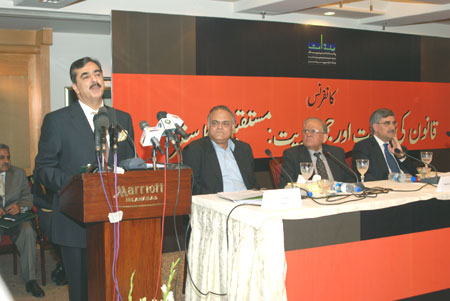
|
|
| |
|
|
| |
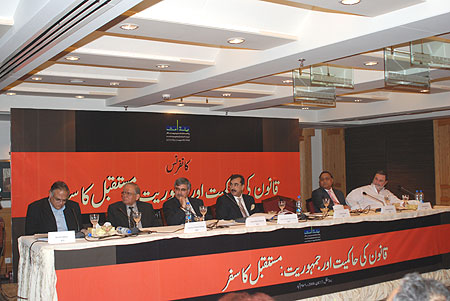
|
|
| |
|
|
| |
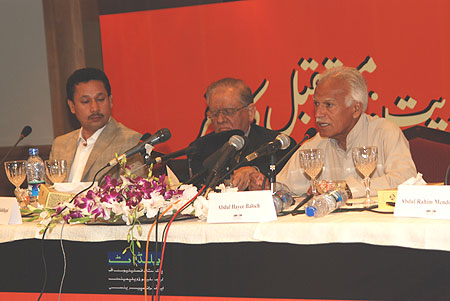
|
|
| |
|
|
| |
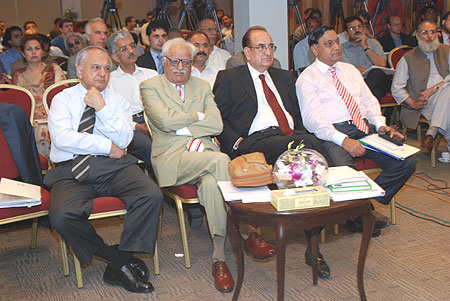
|
|
| |
|
|
| |
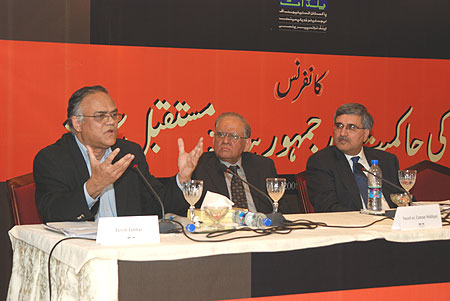
|
|
| |
|
|
| |
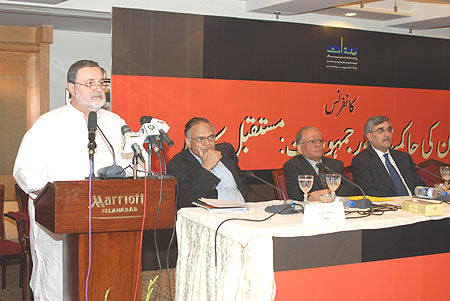
|
|
| |
|
|
| |
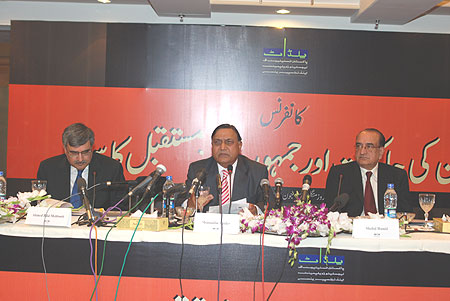
|
|
| |
|
|
| |
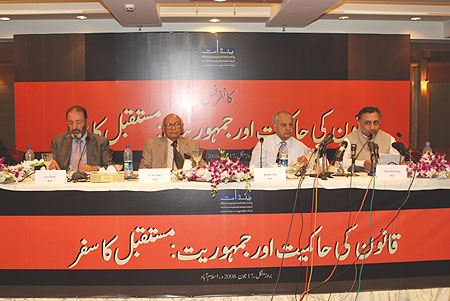
|
|
|
|
|
|
|
|
|